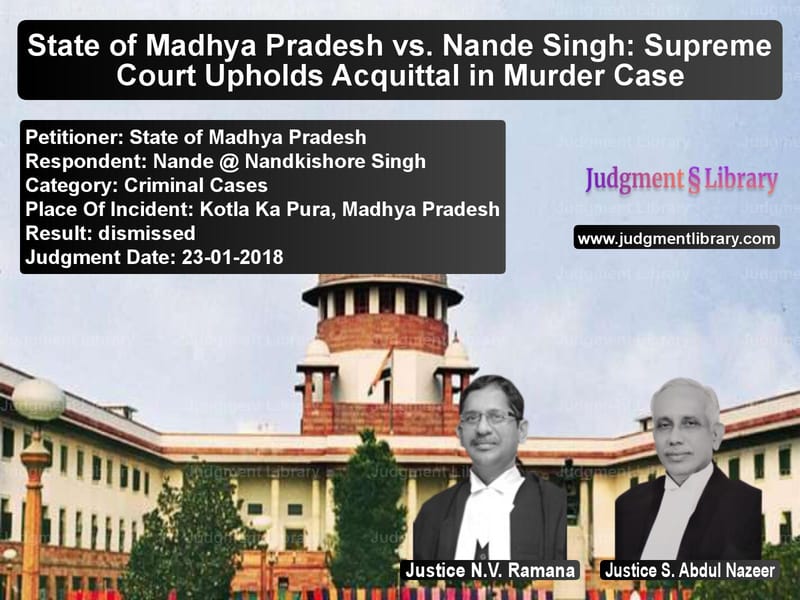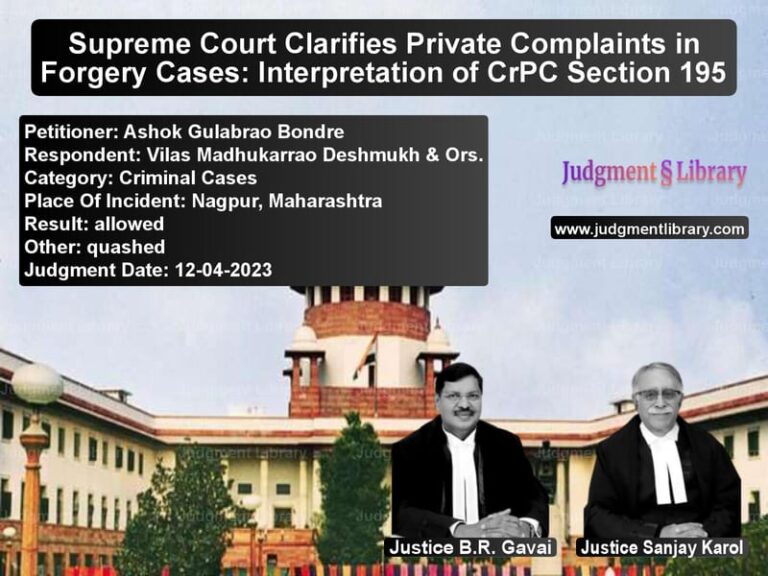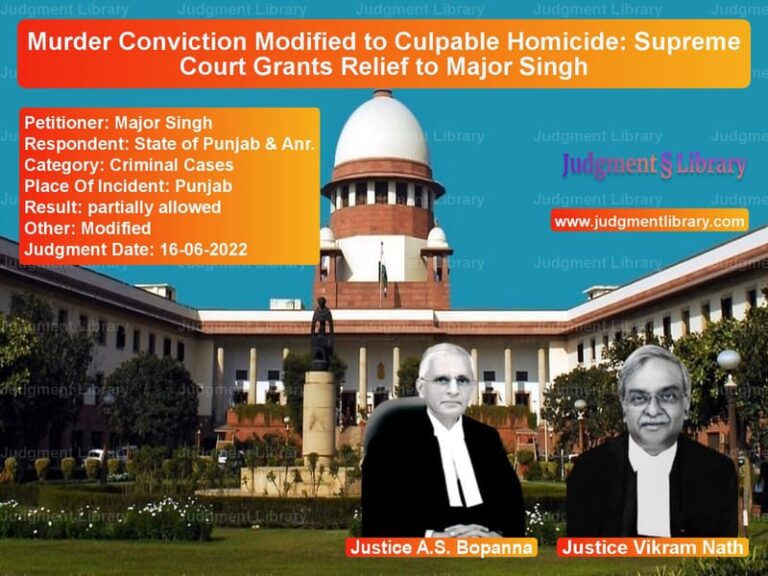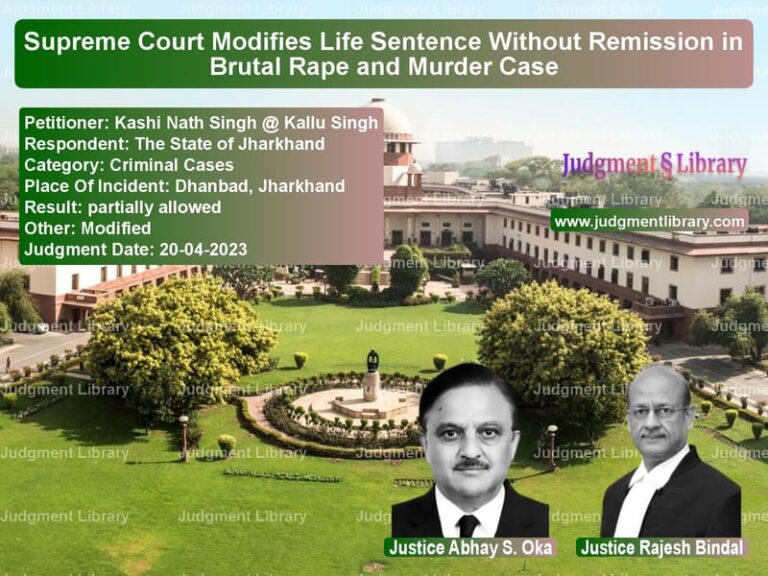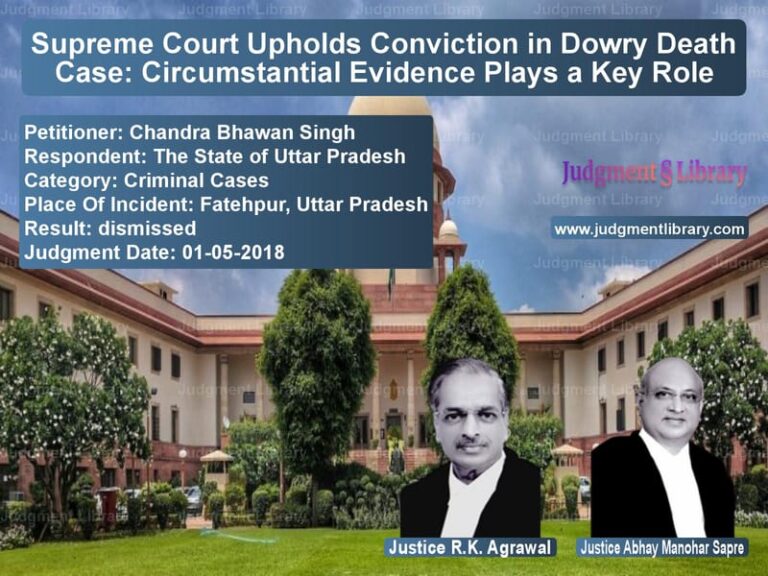State of Madhya Pradesh vs. Nande Singh: Supreme Court Upholds Acquittal in Murder Case
The case of State of Madhya Pradesh vs. Nande @ Nandkishore Singh is a significant ruling concerning criminal law and the principles governing conviction. The Supreme Court examined whether the prosecution had established guilt beyond a reasonable doubt and whether the High Court rightly acquitted the accused after the trial court had convicted him for offenses under Sections 304 Part I and 307 of the Indian Penal Code (IPC).
Background of the Case
The case arose from an incident on June 1, 1994, in Kotla Ka Pura village, Madhya Pradesh. According to the prosecution, the accused, Nande @ Nandkishore Singh, hurled a burning cow dung cake at a group of women attending a marriage ceremony. This act caused severe burn injuries to five women—Parvesh, Deepa, Maya, Rekha, and Baby. Two of the victims, Deepa and Maya, later succumbed to their injuries.
The police registered a case against the accused under Sections 307 (attempt to murder) and 302 (murder) of the IPC. The trial court, however, held that there was no evidence that the accused intended to kill the victims. Instead, the court found him guilty under Section 304 Part I (culpable homicide not amounting to murder) and sentenced him to ten years of rigorous imprisonment.
High Court’s Judgment
The accused challenged his conviction before the Madhya Pradesh High Court. The High Court overturned the trial court’s decision and acquitted him, holding that:
- The prosecution had failed to establish guilt beyond reasonable doubt.
- The eyewitness testimonies contained serious contradictions.
- There was no direct evidence proving that the accused had the intent to cause death.
- There was an unexplained delay in filing the FIR, raising questions about the veracity of the prosecution’s case.
Arguments Before the Supreme Court
Arguments by the State of Madhya Pradesh
- The trial court had correctly convicted the accused after analyzing the statements of eyewitnesses.
- The High Court erred in disregarding the testimonies of key witnesses and placing excessive importance on minor contradictions.
- The accused had knowingly hurled a burning cow dung cake at the victims, making him liable for culpable homicide.
Arguments by the Accused
- The prosecution failed to prove its case beyond reasonable doubt.
- Several prosecution witnesses, including victims, had turned hostile.
- There was a significant delay in lodging the FIR and recording witness statements, suggesting fabrication of evidence.
- The accused had no prior enmity with the victims, making the prosecution’s claims of motive weak.
Supreme Court’s Observations
On the Burden of Proof
- “The prosecution should be able to prove its case beyond all reasonable doubts for awarding conviction to an accused.”
- “In the instant case, admittedly there was no enmity between the accused and the victims.”
On Witness Testimonies
- The Supreme Court found major contradictions in the statements of key witnesses. For example, PW-5 (Rekha) stated in cross-examination that the area was completely dark and people could not be identified. However, PW-7 (Sobaran Singh) contradicted this, stating that the area was well-lit.
- Several prosecution witnesses, including PW-1 (Maya), PW-3 (Natthi Singh), PW-4 (Jugraj Singh), and PW-6 (Parvesh), had turned hostile, refusing to support the prosecution’s case.
On the Delay in Filing the FIR
- “Another discrepancy in the prosecution case is that the First Information Report was lodged on 16.06.1994 i.e. 13 days after the incident and there is no plausible explanation coming forth from the prosecution for this inordinate delay.”
- Statements of witnesses were recorded even later, on 28.06.1994, without justification for the delay.
Supreme Court’s Final Judgment
The Supreme Court upheld the High Court’s judgment and dismissed the appeal filed by the State of Madhya Pradesh. The key reasons were:
- The prosecution had not established guilt beyond a reasonable doubt.
- There were serious contradictions in witness testimonies, undermining the credibility of the case.
- The delay in filing the FIR cast doubt on the prosecution’s version of events.
- The High Court had correctly appreciated the evidence and acquitted the accused.
Legal Significance of the Judgment
This case reinforces key principles of criminal law:
- Presumption of Innocence: The accused is presumed innocent until proven guilty beyond a reasonable doubt.
- Importance of Witness Credibility: Contradictions in eyewitness testimonies can weaken the prosecution’s case.
- Timely FIR Filing: Delay in lodging an FIR without reasonable explanation can raise suspicions of fabrication.
- High Court’s Role in Acquittal: The Supreme Court rarely interferes with acquittals unless there is a glaring mistake or omission of vital evidence.
Conclusion
The Supreme Court’s judgment in State of Madhya Pradesh vs. Nande Singh upholds the fundamental principles of criminal justice. It emphasizes that mere allegations are insufficient to convict an individual; the prosecution must establish guilt with credible, corroborative, and consistent evidence. This ruling serves as a vital precedent in cases where the prosecution’s case relies heavily on circumstantial evidence and witness testimonies.
Don’t miss out on the full details! Download the complete judgment in PDF format below and gain valuable insights instantly!
Download Judgment: State of Madhya Prad vs Nande @ Nandkishore Supreme Court of India Judgment Dated 23-01-2018.pdf
Direct Downlaod Judgment: Direct downlaod this Judgment
See all petitions in Murder Cases
See all petitions in Attempt to Murder Cases
See all petitions in Judgment by N.V. Ramana
See all petitions in Judgment by S. Abdul Nazeer
See all petitions in dismissed
See all petitions in supreme court of India judgments January 2018
See all petitions in 2018 judgments
See all posts in Criminal Cases Category
See all allowed petitions in Criminal Cases Category
See all Dismissed petitions in Criminal Cases Category
See all partially allowed petitions in Criminal Cases Category

